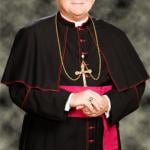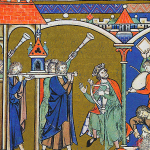Last updated on: January 19, 2017 at 4:56 pm
By
CNA Daily News
Rome, Italy, Jan 19, 2017 / 09:56 am (CNA/EWTN News).- After the death of Opus Dei Prelate Bishop Javier Echevarría Rodríguez in December, members of the prelature are gathering in Rome in preparation for the election of their new leader, which will take place in the coming days. Set to begin Jan. 21 with a special session for women, the election process has no definite end date, since after the new prelate’s election, discussion about future governance is expected to last several days. The former prelate, Bishop Echevarría, died Dec. 12 at the age of 84 in Rome due to respiratory failure several days after being hospitalized with pneumonia. The bishop served as St. Josemaria's secretary from 1953 to 1975, and was ordained a priest of the prelature in 1955, at the age of 23. He was later named secretary general of Opus Dei, and was elected prelate in 1994. He was consecrated a bishop the following year. Since Echevarría’s death the prelature's ordinary government has been headed by his auxiliary, Msgr. Fernando Ocariz, expected by some to be a natural replacement for the late prelate.Context Founded in 1920 by St. Josemaria Escriva, Opus Dei was declared a “personal prelature” by St. John Paul II in 1982, meaning it is a structure that is composed of a prelate, clergy, and lay members united in carrying out certain pastoral activities through a specific spiritual path that isn’t limited to geography, but can be lived no matter where its members are. Until now, the organization is the only personal prelature in the Catholic Church. Opus Dei’s spirituality emphasizes that holiness can be achieved by anyone, and is dedicated to spiritual growth and discipleship among the laity, teaching its members to use their work and their ordinary activities as a way to encounter God. Currently there are roughly 92,000 members of the prelature, of whom 2,083 are priests. Apart from the members of the Priestly Society of the Holy Cross, there are some 1,900 priests who serve in dioceses throughout the world. However, despite the prelature’s many priests, the majority of members are women, who form roughly 57 percent of the prelature. Once the new prelate has been approved by the Pope, he will become the third successor of St. Josemaria Escriva, whose immediate successor was Bl. Alvaro del Portillo. In a Jan. 15 article on the Opus Dei website, Msgr. Ocariz said members “are living this period in an attitude of prayer, going especially to the Holy Spirit.” “We live these days very close to the Holy Father Francis and the whole Church, of which Opus Dei is a small part,” he said, adding that “of course, we feel a strong sense of gratitude for the pastoral work and the good example given by Bishop Javier Echevarría.”Conditions For a candidate to be eligible as the next Prelate they must be a priest who is at least 40 years old, has been a part of the prelature for at least 10 years, has been ordained for at least five years, and is a member of the Congress of electors. Currently there are 94 priests from 45 countries who fit the bill, including many who serve as regional vicars, meaning they represent the Prelate in the countries in which they serve. Other eligible priests have either spent long tenures working in Rome or in one of the 49 circumscriptions that make up the prelature. According to Opus Dei’s statutes, which list a set of qualities desirable in a prelate, their leader must in short stand out in terms of how he lives the virtues of piety, charity, and prudence, his love for the Church and the Magisterium, as well as his fidelity to the spirit of Opus Dei. Studies, both civil and ecclesial, are also factors, as well as having competence in pastoral government.The Process Elections for a new prelate begin with a plenary meeting of the Central Advisory, the prelature’s women’s council, which will take place Jan. 21. During this initial stage, each of the women participating will submit the name or names from among the priests in the electoral congress whom they think is best suited for the job. They will then pass these recommendations to the congress, who will vote for a candidate with these suggestions in mind. The official election process is set to begin Jan. 23. A total of 194 faithful, all men, involved in Opus Dei pastoral work throughout the world will participate in the actual elections, including both priests and lay people who are at least 32 years old and have been a part of the prelature for at least nine years. In comments at a Jan. 16 press briefing on the elections, Professor Ines Llorens, a canonist and member of Opus Dei, stressed the importance of the women’s contribution at the start of the process, saying the Central Advisory council “is the central department and has an important role in the government of Opus Dei.” Referencing their founder, she said St. Josemaria Escriva “wanted women to have a specific part to say things and he wanted this to be manifested in the prelature’s statutes.” “The fact that we are the first to say our opinions is important. That voice is always listened to.” Once the elections are over and the new prelate has accepted the position, either he or a representative of the prelature will ask Pope Francis for his confirmation of the candidate, since it is technically the Pope who appoints the Prelate of Opus Dei. The Pope can reject the new prelate, in which case the electoral congress would go back to the drawing board and propose a new candidate. However, should Francis accept the new prelate, participants in the congress will then meet for several more days in order to select members of the central councils that assist the prelate in his governance. Professor Eduardo Baura, also a canonist and member of the prelature who was present at the Jan. 16 briefing, told journalists that “being a personal prelature, Opus Dei is not like dioceses where there is a procedure – the proposals of the nuncios, the relationship with the episcopal conference, the proposals of the Congregation for Bishops.” “This process isn't there for the Opus Dei Prelate,” he said, noting that when the Pope gave the prelature its statutes, “he chose the canonical method of an electoral congress with an election and then a nomination from the Pope.” The Pope's decision “is unquestionable,” Baura said, but noted that “it usually confirms what has been decided in the congress.” In the final stage of the process, members of the congress will make an evaluation of the current state of the prelature and its activities throughout the world. Plenary sessions will then be held to discuss different proposals determining the guidelines for the new incoming government, who will serve under the new prelate for an eight-year period until the next general congress. Read more















